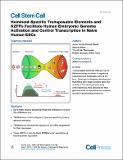| dc.contributor.author | Pontis, Julien | |
| dc.contributor.author | Planet, Evarist | |
| dc.contributor.author | Offner, Sandra | |
| dc.contributor.author | Turelli, Priscilla | |
| dc.contributor.author | Duc, Julien | |
| dc.contributor.author | Coudray, Alexandre | |
| dc.contributor.author | Theunissen, Thorold W. | |
| dc.contributor.author | Jaenisch, Rudolf | |
| dc.contributor.author | Trono, Didier | |
| dc.date.accessioned | 2020-06-23T14:29:56Z | |
| dc.date.available | 2020-06-23T14:29:56Z | |
| dc.date.issued | 2019-04 | |
| dc.date.submitted | 2019-02 | |
| dc.identifier.issn | 1934-5909 | |
| dc.identifier.uri | https://hdl.handle.net/1721.1/125928 | |
| dc.description.abstract | Expansion of transposable elements (TEs) coincides with evolutionary shifts in gene expression. TEs frequently harbor binding sites for transcriptional regulators, thus enabling coordinated genome-wide activation of species- and context-specific gene expression programs, but such regulation must be balanced against their genotoxic potential. Here, we show that Krüppel-associated box (KRAB)-containing zinc finger proteins (KZFPs) control the timely and pleiotropic activation of TE-derived transcriptional cis regulators during early embryogenesis. Evolutionarily recent SVA, HERVK, and HERVH TE subgroups contribute significantly to chromatin opening during human embryonic genome activation and are KLF-stimulated enhancers in naive human embryonic stem cells (hESCs). KZFPs of corresponding evolutionary ages are simultaneously induced and repress the transcriptional activity of these TEs. Finally, the same KZFP-controlled TE-based enhancers later serve as developmental and tissue-specific enhancers. Thus, by controlling the transcriptional impact of TEs during embryogenesis, KZFPs facilitate their genome-wide incorporation into transcriptional networks, thereby contributing to human genome regulation. Transposable elements (TEs) are key to the evolutionary turnover of regulatory sequences but potentially toxic to the host. Trono and colleagues demonstrate that KRAB zinc-finger proteins tame the activity of TEs during human early embryogenesis, thus allowing for their genome-wide incorporation into species-specific transcriptional networks. | en_US |
| dc.description.sponsorship | National Institutes of Health (Grant R37HD045022) | en_US |
| dc.description.sponsorship | National Institutes of Health (Grant R01-NS088538) | en_US |
| dc.language.iso | en | |
| dc.publisher | Elsevier BV | en_US |
| dc.relation.isversionof | http://dx.doi.org/10.1016/j.stem.2019.03.012 | en_US |
| dc.rights | Creative Commons Attribution-NonCommercial-NoDerivs License | en_US |
| dc.rights.uri | http://creativecommons.org/licenses/by-nc-nd/4.0/ | en_US |
| dc.source | Elsevier | en_US |
| dc.title | Hominoid-Specific Transposable Elements and KZFPs Facilitate Human Embryonic Genome Activation and Control Transcription in Naive Human ESCs | en_US |
| dc.type | Article | en_US |
| dc.identifier.citation | Pontis, Julien et al. "Hominoid-Specific Transposable Elements and KZFPs Facilitate Human Embryonic Genome Activation and Control Transcription in Naive Human ESCs." Cell Stem Cell 24, 5 (April 2019): P724-735.e5 © 2019 The Authors | en_US |
| dc.contributor.department | Massachusetts Institute of Technology. Department of Biology | en_US |
| dc.contributor.department | Whitehead Institute for Biomedical Research | en_US |
| dc.relation.journal | Cell Stem Cell | en_US |
| dc.eprint.version | Final published version | en_US |
| dc.type.uri | http://purl.org/eprint/type/JournalArticle | en_US |
| eprint.status | http://purl.org/eprint/status/PeerReviewed | en_US |
| dc.date.updated | 2019-12-12T14:12:49Z | |
| dspace.date.submission | 2019-12-12T14:12:52Z | |
| mit.journal.volume | 24 | en_US |
| mit.journal.issue | 5 | en_US |
| mit.metadata.status | Complete | |
